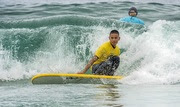 Injured Marine fulfills dream of learning to surf
Injured Marine fulfills dream of learning to surfMarine Corps Cpl. Leighton Anderson surfs a closed out wave during the Naval Medical Center San Diego surf therapy clinic in Del Mar, California. Participation in the therapy clinic for patients like Leighton is medically appointed, and its many benefits include pain management and post-traumatic stress disorder treatment. (DoD photo by EJ Hersom) by: Shannon Collins, DoD News Features, Defense Media Activity
WASHINGTON — Growing up in Gardena, California, now-Marine Corps Cpl. Leighton Anderson recalled that as a boy his Navy father would take him to military airshows.
At that time, Anderson said he wanted to be a fighter pilot.
“I [later] realized I can’t do that because of my eyesight. But my dad took me over to [Marine Corps Air Station] Miramar, and I saw all of the aviation things and the people flying. I always wanted to be a part of the Blue Angels with their jets,” Anderson said.
Anderson didn’t get assigned with the Blue Angels maintenance and support team, but he did get become a crew chief with MV-22 tilt-rotor Osprey aircraft at Okinawa, Japan.
As an Osprey crew chief, Anderson said he inspected the aircraft, repaired the engines and replaced worn parts.
“While we’re flying, we back up the pilots. We load cargo and passengers as well,” he said.
InjuryIn December 2016, after serving four years on Osprey aircraft, Anderson was severely injured in an Osprey crash during a training mission.
“We crashed at 200 mph, and I was strapped down,” he said.
Anderson said he received a concussion, and injured his jaw and one of his eyes. He said he was required to wear an eye patch over the injured eye, which required stitches.
Anderson said he also broke his right hand and right foot.
“I broke some ribs and collapsed my left lung,” Anderson continued. “I bruised my heart and fractured my right scapula.”
Anderson said he also has traumatic brain injury and post-traumatic stress disorder.
Surfing ClinicToday, Anderson is a patient at Naval Medical Center San Diego, where he’s learned how to surf as part of his recovery.
Anderson said he looked at the other recreation programs the Naval Medical Center San Diego’s Health and Wellness Department’s Wounded, Ill and Injured Wellness division offers, but the surfing clinic stood out to him the most.
“I’ve always wanted to learn how to surf since I’m from California,” he said. “I tried it three times in my life and never did it. And I was like, ‘Let me try it through the program here.’ And then after that, I was hooked. It was pretty sweet.”
Anderson said the surfing clinic has helped him physically and mentally.
“I had so many barriers because once I was injured I was like, ‘I don’t know if I can do that. I might hurt myself,’” he said. “I have a little bit of PTSD, and I didn’t think I would enjoy anything.”
Anderson added, “Once I tried it, I broke down a lot of barriers I had mentally and physically. I had weak tendons in my hand and my foot, but with surfing they’re starting to get better. And mentally, it makes me happy. I love it. Everybody’s really supportive. It’s just something everybody should take on.”
Disclaimer: Re-published content may have been edited for length and clarity. Read original post.
Read More ...
STAY CONNECTED:
Military Health System
The Pentagon
Washington, D.C. 20301, United States










No comments:
Post a Comment